"If This World Were Mine" is a 1967 song by soul music duo Marvin Gaye and Tammi Terrell from their album United. Written solely by Gaye, it was one of the few songs they recorded without Ashford & Simpson writing or producing. When it was released as a single in November 1967 as the B-side to the duo's "If I Could Build My Whole World Around You", it hit the Billboard pop singles chart, peaking at number sixty-eight, and peaked at number twenty-seven on the Billboard R&B singles chart. Gaye would later put the song into his set list during his last tours in the early-1980s as he performed a medley of his hits with Terrell. The song was covered a year later by Joe Bataan on the 1968 Fania Allstars LP Live at the Red Garter, Vol. 2, and in 1969 by Ambrose Slade (pre-Slade) on their album Beginnings.

"The Best Things in Life Are Free" is a Grammy-nominated duet between American singers Luther Vandross and Janet Jackson, recorded for the Jimmy Jam and Terry Lewis-produced soundtrack to the 1992 American film, Mo' Money, starring Damon Wayans. The song was composed by Jam, Lewis, as well as Michael Bivins and Ronnie DeVoe. Additionally, the song was remixed by David Morales, Frankie Knuckles, and CJ Mackintosh. The duet became a major hit in several countries, peaking at number two in Australia and the United Kingdom, number six in Ireland and New Zealand, number eight in Canada and Germany and number 10 in the United States.
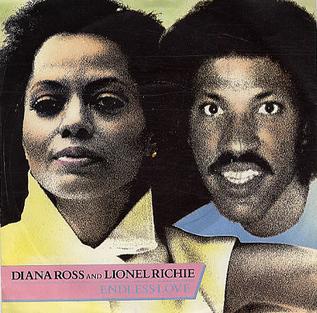
"Endless Love" is a song written by Lionel Richie and originally recorded as a duet between Richie and fellow R&B singer Diana Ross. In this ballad, the singers declare their "endless love" for one another. It was covered by R&B singer Luther Vandross with fellow R&B singer Mariah Carey and also by country music singer Shania Twain. Richie's friend Kenny Rogers has also recorded the song. Billboard has named the original version as the greatest song duet of all-time.
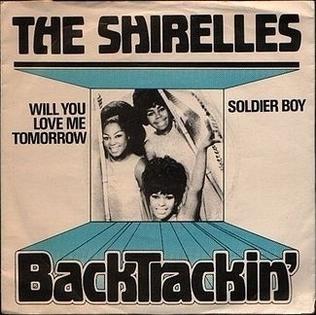
"Will You Love Me Tomorrow", also known as "Will You Still Love Me Tomorrow", is a song written by Gerry Goffin and Carole King. It was originally recorded in 1960 by the Shirelles, who took their single to number one on the Billboard Hot 100 chart. The song is also notable for being the first song by a black all-girl group to reach number one in the United States. It has since been recorded by many artists over the years, including a 1971 version by co-writer Carole King.
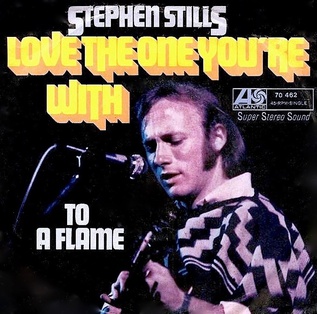
"Love the One You're With" is a song by folk rocker Stephen Stills. It was released as the lead single from his debut self-titled studio album in November 1970. The song, inspired by a remark Stills heard from musician Billy Preston, became his biggest hit single, peaking at No. 14 on the Billboard Hot 100 in early 1971. David Crosby and Graham Nash, Stills' fellow members of Crosby, Stills & Nash, provide background vocals on the song. The song was also covered by a number of artists, including Aretha Franklin, The Isley Brothers, Bucks Fizz, and Luther Vandross.
"Dance with My Father" is the RIAA Gold-certified title track to singer and songwriter Luther Vandross' thirteenth studio album. With Richard Marx, Vandross wrote the song based on his personal experience. The lyrics recall childhood memories with Vandross' father, who used to dance with him and his mother.
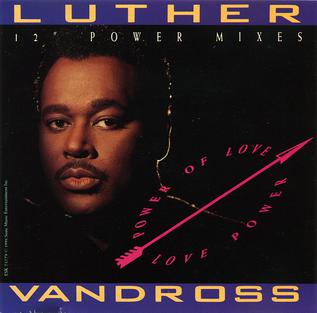
"Power of Love/Love Power" is a single by American singer-songwriter Luther Vandross. It was released on April 9, 1991 as the lead single from his 1991 album of the same name. The hit song spent two weeks at number one on the US R&B chart, and peaked at number four on the US pop chart, becoming his biggest pop solo hit.
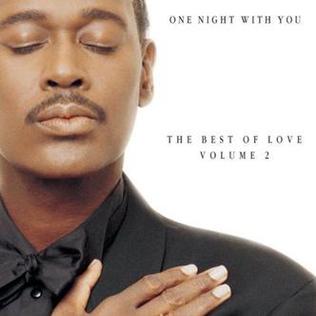
One Night with You: The Best of Love, Volume 2 is the third compilation album released by American singer Luther Vandross, released on September 15, 1997 by Epic Records. It is his second compilation album to be released stateside, and is a continuation of his triple-platinum selling first compilation The Best of Luther Vandross... The Best of Love (1989). One Night with You contains four newly recorded songs including the R. Kelly-penned and Grammy-nominated "When You Call on Me/Baby That's When I Come Runnin'" and selections compiled from his later studio albums such as Songs (1994), This Is Christmas (1995), Never Let Me Go (1993), Power of Love (1991) and Your Secret Love (1996).

"Going in Circles" is a song written by Jerry Peters and Anita Poree, and originally performed by The Friends of Distinction on their 1969 album Grazin', reaching number 15 on the U.S. Hot 100, and number three on the R&B chart. The song has since been covered numerous times by other artists, including Isaac Hayes and Luther Vandross. In addition, the song's co-composer, Jerry Peters released his own version of the tune on his 1972 solo album Blueprint for Discovery.

"Buy Me a Rose" is a song written by Jim Funk and Erik Hickenlooper, and recorded by American country music artist Kenny Rogers. It was released in October 1999 as the third single from his album She Rides Wild Horses. Upon reaching Number One on the Billboard Hot Country Singles & Tracks charts in May 2000, the song made Rogers the oldest country singer to have a Number One hit.
"Stop to Love" is a song by American recording R&B/soul artist Luther Vandross. Released in 1986 as the lead single from his album Give Me the Reason. It was his first number-one single on the R&B chart since "Never Too Much" in 1981. The upbeat single was also a crossover hit, peaking at number fifteen on the Billboard Hot 100.
"There's Nothing Better Than Love" is a 1986 song by American recording artist Luther Vandross and actor/dancer/singer Gregory Hines. The single peaked to number one on the U.S. Hot Black Singles chart, for one week, and peaked at #50 on the Billboard Hot 100 chart. "There's Nothing Better Than Love" was Luther Vandross' follow up to his previous number one R&B hit, "Stop To Love".
"Any Love" is song by American recording artist Luther Vandross released as the first single from his six studio album of the same name (1988) and earned Vandross his fourth No. 1 single on Billboards Hot Black Singles Chart. "Any Love" also peaked at No. 12 on the Adult Contemporary Chart. The song also garnered two Grammy Award nominations at the 31st Annual Grammy Awards for Best R&B Song and Best Male R&B Vocal Performance.
"I'd Rather" is a song by American recording R&B/soul artist Luther Vandross. The song is from his eponymous album released in 2001, and is written and produced by Shep Crawford. The song is the third and final single from the album. "I'd Rather" was a top twenty hit on Billboard's Top Adult Contemporary, and top forty on the Hot R&B/Hip-Hop Songs charts.
"Bad Boy/Having a Party" is a song by American recording artist Luther Vandross in 1982. The song was released as the first single in support of his album Forever, for Always, for Love. The single became a top five R&B hit which peaked to number-three on the Hot R&B Singles chart, and reached #55 on the Billboard Hot 100. The song was featured during the opening credits of the 1990 film House Party. The bridge samples the chorus from the Sam Cooke song Having a Party, but with new lyrics added to the end.
"She Won’t Talk to Me" is a song by American recording artist Luther Vandross released in 1988. It is the second single from his album Any Love. The song was a top five U.S. R&B hit, top 20 dance play hit, and a top 40 hit on the Billboard’s Hot 100. Vandross performed the song on the January 28, 1989 episode of Saturday Night Live.
"For You to Love" is a 1988 song by the American recording artist, Luther Vandross. The single was released in 1989 in support of his hit album Any Love. The song was a top five U.S. R&B hit which peaked to No. 3 on the R&B singles. Vandross' Any Love album charted three top-five singles on the Billboard Hot R&B Singles chart.
"Sometimes It's Only Love" is a 1991 song by American recording artist Luther Vandross. The single was released in 1992 in support of his album Power of Love. The song was a top ten hit on the Billboard's Hot R&B Singles and Hot Adult Contemporary Tracks.
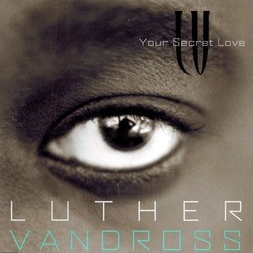
"Your Secret Love" is a 1996 song by American recording artist Luther Vandross. It was released as the lead single in support of his album of the same name. "Your Secret Love" was an R&B hit, the single peaked to No. 5 on Billboard's Hot R&B Singles and No. 14 on the UK Singles Chart.












